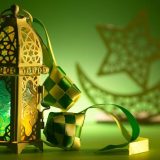
At Your Service The Festival of Sacrifice
June 28, 2023
June 18 began the final month of the Islamic calendar, Thu’l-Hijjah. In Islamic teachings, the Prophet of Islam, Muhammad, informed the Muslim faithful that the performance of good deeds during the first ten days is the greatest and most beloved to Allah (God). The only thing more beloved is struggling for Allah’s cause and dying due to it.
On the eighth day of the last month (i.e., June 26), Muslims worldwide begin the life-altering experience of pilgrimage to the Holy Mosque in Mecca, the final pillar of Islam. Male pilgrims don two white sheets, and women may wear all white, all black, or other colors, depending on their regional customs. They will camp and spend the evening in Mina, an area within the holy city of Mecca. They will chant or sing,
At your service, O Allah, at your service! At your service, You have no partner! Praises, blessings, and dominion only belong to You! You have no partner!
The next day, pilgrims will go to a large area outside Mecca, Arafat (or Arafah). “Arafat Day” is on the ninth (June 27), and pilgrims will pour out their souls, pray, make supplications, read Qur’an, remember Allah, and reflect on Prophet Muhammad’s sermon he delivered to the over 110,000 followers. His sermon reiterated the oneness of Allah. His address emphasized that being conscious of Allah makes a person superior. In addition, he addressed other societal issues.
The ninth day is the spiritual heart and soul of the pilgrimage because Prophetic narrations inform the Muslims that Allah brags to the angels, “Look at them! Dirty and disheveled! On this day, I forgive My servants.” On the ninth, many non-pilgrims send messages to pilgrims they know, asking them to pray for them. It is challenging to describe the enormous amount of spiritual exertion one sees.
Eid al-Adha, the “Sacrifice Festival,” begins when the sun sets. Pilgrims re-enter the holy city, Mecca, in another area, Muzdalifa. They spend the majority of the evening resting. When most of the evening passes, or slightly after dawn, pilgrims will go to the Holy Mosque, circumambulate the Ka’ba (the Black Cube in the heart of the Holy Mosque), return to Mina, and perform other activities. They will sing or chant,
Allah is the Greatest! Allah is the Greatest! There is no deity, but Allah! Allah is the Greatest! Allah is the Greatest! All praises belong to Allah.
According to Prophetic narrations, Eid al-Adha is the greatest day in the year to Allah. If the ninth day is the spiritual pinnacle, then the tenth day (June 28), Eid al-Adha, is the physical pinnacle.
The other activities at Mina are for men to shave their heads or have significantly low haircuts. Women only have to clip a forelock of their hair, equivalent to a fingertip size. Pilgrims slaughter a lamb (although the Ministry of Religion of Saudi Arabia arranges that separately, not requiring a pilgrim to do it themselves), and they stone a large pillar. Stoning the large pillar symbolizes rejecting humanity’s enemy, the devil. According to Prophetic narrations, when Allah instructed Prophet Abraham to slaughter his son, Ishmael, the devil came to dissuade them. Allah commanded Abraham to throw seven stones at him, saying, “Allah is the Greatest.” Pilgrims throw seven small stones saying “Allah is the Greatest” with each throw, commemorating Abraham, his wife, Hagar, and their son, Ishmael, the root ancestor of the Arabs (as an aside, Abraham was also married to Sarah, and they had a son, Isaac, the root ancestor of the Children of Israel).
From the 11th to the 12th (June 29-30) or 13th (July 1), the “Glowing Days” begin. Muslims will stay in Mina, eat from their sacrifices, drink, and remember Allah.
Prophetic narrations inform us that whoever has performed a blessed pilgrimage will return to their lands like a newborn baby—having no sins. Thus, it is truly a new lease on life.
The above is a summary of the pilgrims. What about non-pilgrims? Don’t they have a share in this good?
We mentioned above the virtue of the first ten days. For non-pilgrims, they have an opportunity to do an abundance of good deeds. On Arafah Day, they are encouraged to fast. Prophetic narrations indicate that the one who fasts will have their sins from last year and the next forgiven.
Like Eid al-Fitr, which I have discussed in another blog, non-pilgrim Muslims will come together, pray, and hear a sermon. There is one difference. Many non-pilgrims will slaughter a lamb, goat, or cow, commemorating Prophet Abraham and his family’s sacrifice. Some will donate some of their meat to others, a sign of generosity and communal bonding.
Blessed Eid Al-Adha, pilgrims and non-pilgrims. May your days be a continuous blessing.
